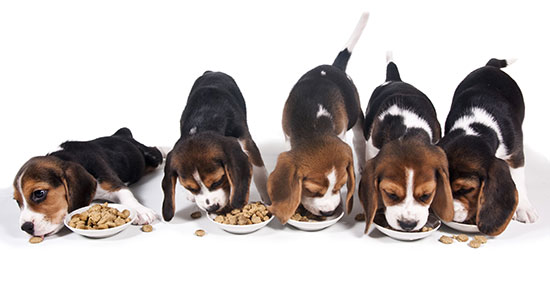Tips for Choosing Healthy Puppy Food
There are two main components that can help your puppy to live a long and healthy life – exercise and diet. While regular exercise is pretty self- explanatory, ensuring that your precious pup receives the right nutrition can be
a little trickier. With dozens of different brands and multiple types of puppy food to choose from, by the time you add confusing labels and sometimes misleading marketing jargon into the mix, you could be forgiven for having no
idea where to start with feeding your puppy.
Why is a ‘puppy diet’ so important?
A healthy diet is crucial to the proper growth and development of your canine companion, as in their early years their bones, muscles, joints, organs and immune system take time to mature. Puppy food is usually especially formulated for the nutritional needs of growing dogs, including providing the higher amounts of protein and fat that are needed before your canine reaches adulthood. It is also often smaller in size, making it much easier to eat and less of a choking hazard for little mouths.
How long should my dog be fed puppy food?
Some owners mistakenly believe that feeding their dog puppy food for longer will help them to be healthier. However, doing so could put your pup at risk of growth diseases such as panosteosis and long bone disease, both of which could cause your pet health complications in the future. Instead, you should aim to feed your dog a specialized puppy diet until he reaches about 80% of his expected adult size, which usually happens at around a year of age. If you aren’t sure if it is the right time, your veterinarian will be able to advise you.
How do I know which is the best puppy food for my pet?
Choose quality brands
One of the best ways to be sure that you are providing your puppy with high- quality food is to be fussy about which brands you buy. The best brands will invest in research and the advice of veterinary nutritionists when formulating their foods.
You should always choose foods from a pet food company that has undergone AAFCO feeding trials. This means that it will have been carefully tested in strictly monitored trials to ensure that there are no deficiencies before being made available to buy in stores.
Size matters!
Puppies come in all shapes and sizes depending on their breed and the puppy food that you choose should reflect this. This is because the nutritional requirements for larger puppies differ from that of smaller dogs. For example, the bone growth for a small breed puppy like a Chihuahua is different to that of a large breed puppy like a Rottweiler or Labrador. The right puppy food will be formulated with the exact blend of nutrients required to ensure the healthy growth and development of your size of dog.
Check the ingredients
What goes into your puppy food is vitally important, so checking the ingredients should be a priority when selecting the right variety for your dog.
Dogs are carnivores and as such, they thrive on a meat-based diet. Any carbohydrate that is added to dog food is usually done so with the sole purpose of holding it together. Therefore, when you are looking at ingredients on yourpuppy food, protein should be at the top of the list. Whole food sources – turkey, beef, chicken or lamb – should be named as one-word ingredients and be the very first thing on the list.
The next ingredient in good quality foods will almost always be a meat source followed by the word ‘meal’ e.g. chicken meal. Then third and fourth on the list should be vegetable-based or whole fruits.
Some of the ingredients to avoid include corn and wheat gluten, meat and grain meals and by-products, BHA, BHT and rendered fat.
Get the advice of your veterinarian
If you are still worried about choosing the right puppy food for your dog, then our veterinarian is the best person to advise you. Contact us and we will be able to recommend the right type of puppy food that will help your furry friend to grow and develop exactly as he should.

